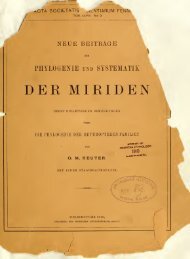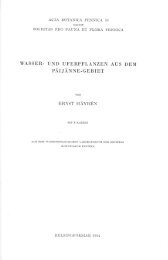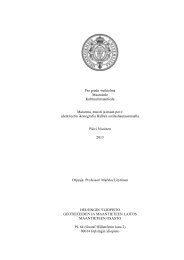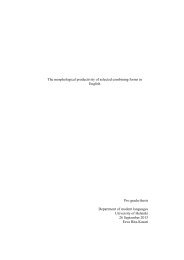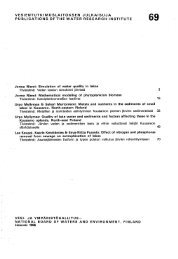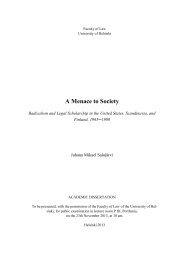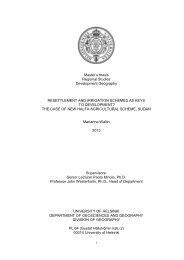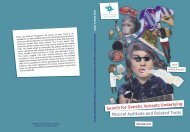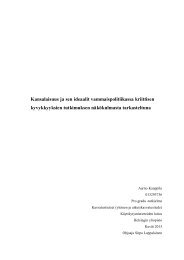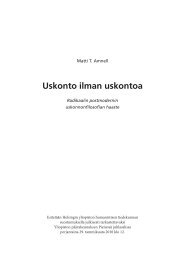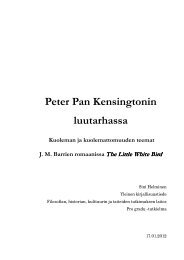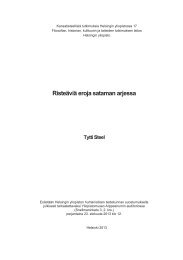HUMANUM - Helda
HUMANUM - Helda
HUMANUM - Helda
Create successful ePaper yourself
Turn your PDF publications into a flip-book with our unique Google optimized e-Paper software.
maailmaneetoksen praktisista seikoista koostuvaksi projektiksi. 193<br />
58<br />
Tässä valossa totuus<br />
uskontojen maailmassa näyttää karkeasti ilmaistuna samastuvan siihen, mikä toimii eli mitkä<br />
ovat uskontoteologian vaikutukset. Tällainen konsekventalistinen ajattelu on ominaista sekä<br />
reaalipolitiikalle että pragmatismille. Uskontoteologian päämääränä ja suoranaisena<br />
totuuskriteerinä, joka mittaa, mikä on oikeaa uskontoteologiaa, ovat sen käytännölliset<br />
vaikutukset, tässä tapauksessa maailmanrauhan toteutuminen. Nämä käytännölliset<br />
vaikutukset voidaan nähdä ja niitä voidaan arvioida ainoastaan kokemukselle ilmenevän<br />
todellisuuden piirissä, ei teorian ja ajattelun maailmassa. Historiallinen ja sosiologinen<br />
lähestymistapa sulautuvat realismilähtöiseen ja pragmatistiseen lähestymistapaan. 194<br />
Yllä<br />
esitetyssä mielessä Küngin maailmaneetos-projektissa on erityisesti John Deweyn William<br />
Jamesin pragmatismiin viittaavia piirteitä samalla tavalla kuin esimerkiksi Langdon Gilkeyn<br />
uskontoteologisessa mallissa. 195 Küng itse määrittelee pragmatismin Jamesin pelkistetympää<br />
uskonnollista pragmatismia muistuttavasti.<br />
193<br />
194<br />
195<br />
Ks. esim. J, 758–761; Küng & Kuschel 1993b, 10, 11; Robinson 1995; VD, 11–13. Ks. myös esim. Bialas<br />
1999e; GBE, 100–102. Vrt. Spaemann 1996 ja toisaalta WWW, 380, 381.<br />
Vrt. J, 666. Ks. myös esim. Küngin Morgentaun reaalipolitiikan pohjustus WWW, 61: ”Bei solchen<br />
frustrierenden Erfahrungen setzte sich die Kritik jeglicher Idealpolitik ein, die nach dem Zweiten Weltkrieg<br />
in der Politik-Theorie [...] in erster Linie von Hans J. Morgentau geleistet wurde, der [...] vor allem auf<br />
Machtpolitik und Interessen setzte. Und wer die Frage nach Macht und Moral behandeln will, muss von der<br />
historischen Praxis auch in die tiefe wissenschaftlicher Theoriebildung vordringen, die ihrerseits – direkt<br />
oder indirekt – die Wahrnehmung und Gestaltung politischer Praxis beeinflusst.” (Kursivointi minun.)<br />
Gilkey 1987, 46–49: ”We have seen the theoretical dilemma that plurality has forced upon us. On the one<br />
hand, the inescapable drive toward ecumenical community, toward respect for and recognition of the other as<br />
other, and of the religious validity and power he or she embodies, has pushed us toward a relativity that<br />
seems defy intellectual resolution. There seems no consistent theological way to relativize and yet to assert<br />
our own symbols – and yet we must do both in dialogue. On the other hand, the shadow side of religious<br />
plurality frequently forces us to resist, to stand somewhere, and also to hold some alternative religious<br />
position with absolute fidelity, courage and perseverance. How are we to understand and resolve this<br />
contradiction or puzzle dealt us by plurality? Faced with this reflective impasse, I suggest we refer to the<br />
venerable, practical American tradition. The puzzle that to reflection may represent a hopeless contradiction,<br />
said John Dewey, can through intelligent practice be fruitfully entered into and successfully resolved. As<br />
James reminds us, moreover, praxis brings with it a forced option, one that cannot be avoided. When praxis<br />
is called for, puzzled immobility before a contradiction or indifferent acceptance of a plurality of options<br />
must both cease – for to exist humanly we must wager, and must enact our wager. So is it with the dilemma<br />
forced on us by an oppressive ideology: faced with that menace, we must act – that is, we will act whether we<br />
wish to or not. More specifically, we will either conform or we will resist; and both are actions, choices that<br />
transform much about ourselves that went before, not least our relationship to our social environment. Praxis<br />
and its demands do not leave us alone. […] The dialectic works both ways: relativizing the manifestation on<br />
the one hand, and so all incarnations of the absolute, and yet manifesting as well through the relative an



